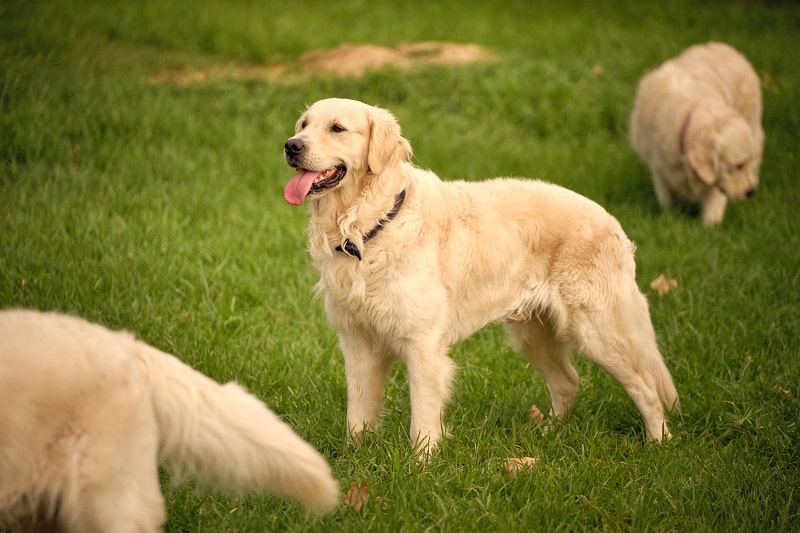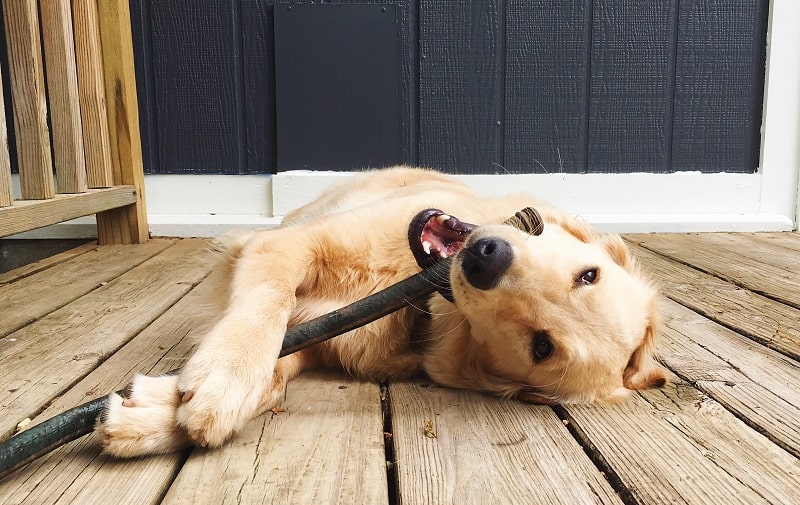Table of Contents
One of the most popular dog breeds in the United States, Golden Retrievers make great family pets for their tolerant nature and friendly attitude. They are intelligent, easy to train, and can live a healthy 10-13 years. However, like any other breed, Golden Retrievers can be affected by several health conditions like seizures, anxiety, cancer, and diabetes.
These pups can also suffer from genetic disorders, including Autism and Down Syndrome. In this guide, let us discuss all you should know about Down Syndrome in Golden Retrievers.
Dog with Down Syndrome Symptoms
Down syndrome is a genetic disorder commonly seen in humans. People with this disorder show distinct physical features like a flat face, short neck, slanted eyes, small chin, abnormal ear appearance, etc.. These people also have a slower physical and mental development and are at higher risks of health issues such as gastrointestinal problems, heart diseases, impaired vision, and infertility.
Though this genetic condition is still unconfirmed in dogs, there are some signs and symptoms that resemble those of Down syndrome. Golden Retrievers can show markers like delayed development, slow growth, cognitive impairment, and short limbs, associated with genetic abnormalities. A veterinarian should be able to identify a dog with down syndrome.
You should consider consulting a vet if your pup has symptoms like –
- Impaired hearing
- Odd behavior
- Poor eyesight
- Congenital heart disease
- Strange physical features like broad nose, protruding tongue, deformed hips, and legs, or frequent hair loss, uncommon patches on the skin, and other suspicious traits
- Thyroid problems
Even if the vet is not able to confirm Down Syndrome, he/she can work with you to take special care of your pup to address the problems you and your pooch are facing and improve its overall quality of life.
What if Your Golden Retriever Puppy has Down Syndrome?
Golden Retrievers can be affected by several genetic disorders including Down Syndrome. Early diagnosis of such problems is necessary to prevent further complications. Look for signs like thyroid, developmental problems in limbs and joints, dullness in the eyes, and skin allergies and infections. Any such symptoms and signs should be reported to the vet at the earliest to rule out the conditions.
Though there is no defined cure for this illness, there are several measures you can take to manage its symptoms and make the pet feel comfortable and healthy. Training these special dogs needs time and patience. Maintenance can be more expensive because they need frequent visits to the vet and require spending on diagnosis, tests, and medications.
Diet
Regulating and monitoring the diet for golden retrievers with Down syndrome helps keep them healthy and extend their lifespan. Encourage your pup to eat a balanced diet and add a lot of protein-rich foods to provide energy to strengthen muscles and stay active. If the dog does not eat, you can use appetite stimulants.
Exercise
Like any other dog, exercise is a must for pups affected with Down Syndrome. Encourage it to have plenty of regular exercise. Take it for a walk around the neighborhood or visit the park for play. You can also schedule training and sports sessions to help build strength. However, pups with this disorder have poor skeletal structures and heart problems, so it’s best to seek advice from the vet about activities and exercises your dog can safely indulge in.
Environment
If your golden retriever has developmental or cognitive delays, you must ensure the safety of its environment. Ensure the area is easy to move around and free of potentially dangerous items. If the pup has poor vision, it could run into big objects or walls, resulting in injuries. Remove such dangers from the environment.
You can consider throwing rugs around to prevent the pup from accidentally slipping and hurting itself. Non-slip socks provide some traction to a dog with Down syndrome. If you have stairs, install gates to reduce the risk of falling. Invest in some equipment like a wheelchair if your pup has any impairment or disability.
Vet Visits
Special pups need frequent appointments with the vet to follow up on their symptoms. Get routine check-ups as advised. The vet may prescribe medications and supplements. Pet owners must follow strict dosage and timing. Any reaction or allergy to a drug like itching, fainting, or panting should be reported immediately to the vet.
Golden Retriever with Autism – Getting Started
Autism is another genetic condition like Down Syndrome that doesn’t yet have an official diagnosis in dogs. However, there are some unusual behaviors that point to genetic abnormalities in pups.
A golden retriever may show signs and symptoms like:
- social anxiety,
- fear and aggression when interacting with other dogs and humans,
- repetitive behaviors like moving in a circular motion,
- challenges accepting new situations, or strange sensory responses.
As a pet owner, you must report any such symptoms to your vet so that he can give you some idea of what is going on and suggest ways to manage the symptoms. Talk to your vet about your pup’s routine, behavior, and changes you have noticed. Once the vet gets a picture of the symptoms the dog is struggling with, he can devise an action plan to manage the condition and help your pooch stay calm, happy, and healthy.
For example, if your pet has problems with repetitive behavior, your vet can suggest ways to redirect that behavior, such as distractions or taking it out for walks. Dogs that fear other dogs, as well as people, can be taken to less populated areas. Avoid dog parks when you can. Though there is no cure for these conditions, fur parents can take essential steps to avoid triggers. This helps the pups manage their symptoms and keep stress levels as low as possible.
If a dog with down syndrome survives and grows up, it makes a friendly companion like any normal pet. It just requires some special care and attention. But your beloved pooch can still live a long, comfortable, and healthy life.
If you really love him, let him know as much as possible. You can show him more kindness and affection in your life. Take him out for a run, make friends, just don’t forget to bring his dog tags in case he gets lost. Dog tags can be made one-of-a-kind with custom enamel pins, and with a design of his name, headshot, or footprints, it will be even more meaningful. Not only does it express your love for your dog, but it’s also a collectible memento of your relationship.





